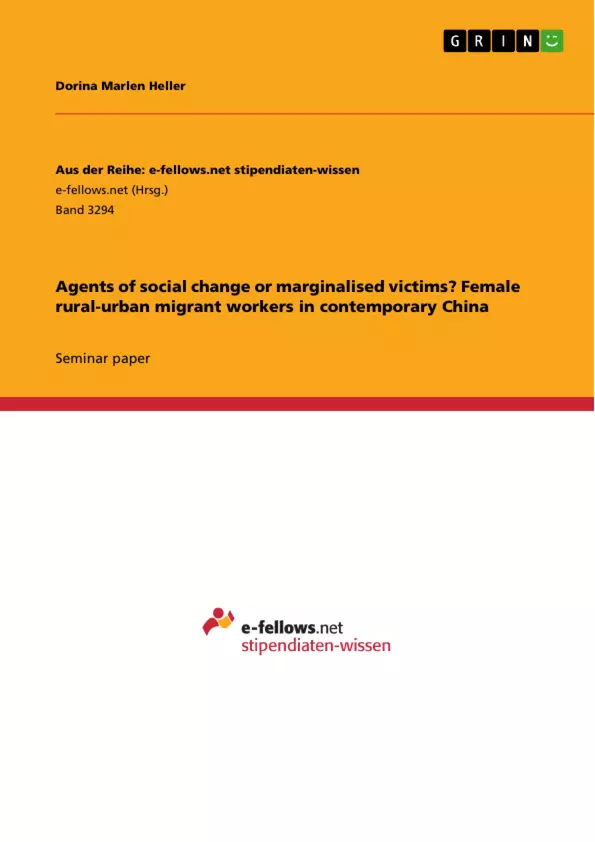China’s rapid transition to a market-oriented economy has led to a mass migration from the countryside to the cities. Chinese rural-urban migrant workers constitute the largest ever labor force in human history. Approximately a third of them are female. Even though migration is a gendered phenomenon and gender cannot be treated as a mere variable of many, the experiences of Chinese women as migrant workers are underrepresented. Many are faced with different challenges than men, such as sexual exploitation, discrimination and abuse. And even though migration can help women to gain autonomy and independence through their increased social, economic and physical mobility, the gender-specific dynamics of migration can also force women into contexts of suppression and dependence.
One of the central questions in the debate surrounding gender and migration in China is, whether Chinese female rural-urban migrant workers should be seen as marginalised victims or rather as agents of social change. However all too often the debate remains caught up in a rigid dichotomy, neglecting the complex interwoven net of identity, economic (in)dependence and social networks these women live and work in. I argue that while there is ground for either one of these characterisations of Chinese female migrant workers – as victims as well as agents of social change – this binary approach is not beneficial to a fruitful discussion. Rather than defending one of these viewpoints, the debate should focus more on acknowledging the complex diversity of this issue as well as on eliminating current research deficits through further qualitative and quantitative analysis and fieldwork.
Inhaltsverzeichnis (Table of Contents)
- Introduction
- Context: Rural-urban migrant workers in contemporary China
- The hukou (household registration) system
- Reform and the lack thereof
- China's rapid economic transition
- Female rural-urban migrant workers in China: Between marginalisation and independence
- Marginalised victims or agents of social change? Public discourse and narrated reality
- Challenges of female rural-urban migrant workers
- The effects of migration on female rural-urban migrant workers
- Conclusion
Zielsetzung und Themenschwerpunkte (Objectives and Key Themes)
This research aims to critically analyze the experiences of female rural-urban migrant workers in contemporary China, considering their roles as both potential victims of marginalization and agents of social change. The study explores the complex interplay of identity, economic (in)dependence, and social networks within the context of migration.
- The hukou system and its impact on rural-urban migration
- Gendered experiences of migration and its impact on women's lives
- Challenges faced by female migrant workers, including sexual exploitation, discrimination, and abuse
- The role of migration in fostering both autonomy and dependence for women
- The need for further qualitative and quantitative research to understand the complexities of female migrant workers' experiences
Zusammenfassung der Kapitel (Chapter Summaries)
- Introduction: The chapter establishes the context for studying female rural-urban migrant workers in China. It highlights the significant number of migrant workers, emphasizing the underrepresentation of women's experiences in existing research. The chapter outlines the central research question: whether female migrant workers should be seen as victims or agents of change, and argues for a nuanced approach that acknowledges the complexities of their situation.
- Context: Rural-urban migrant workers in contemporary China: This chapter delves into the historical and socioeconomic factors that contribute to rural-urban migration in China. It explores the hukou system, China's household registration system, and its role in creating a dualistic socioeconomic structure. The chapter also examines the rapid economic transition in China, and how it has led to an increase in demand for low-skilled labor, fueling migration from rural areas to cities.
- Female rural-urban migrant workers in China: Between marginalisation and independence: This chapter focuses on the experiences of female rural-urban migrant workers in China. It examines public discourse and narratives surrounding these women, highlighting the challenges they face, including sexual exploitation, discrimination, and abuse. The chapter also explores the potential for migration to empower women through increased social, economic, and physical mobility, while acknowledging the risks of suppression and dependence.
Schlüsselwörter (Keywords)
This research focuses on the complex issue of rural-urban migration in China, with a particular emphasis on the experiences of female migrant workers. Key themes include the hukou system, gendered migration patterns, social marginalization, economic dependence, social networks, and the need for comprehensive policy reforms to improve the lives of migrant workers.
- Arbeit zitieren
- Dorina Marlen Heller (Autor:in), 2018, Agents of social change or marginalised victims? Female rural-urban migrant workers in contemporary China, München, GRIN Verlag, https://www.hausarbeiten.de/document/505933


